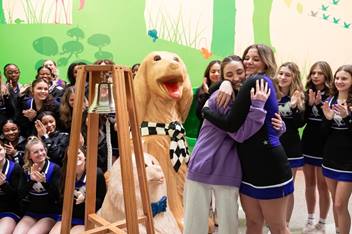Name: Mariah and Milan
Condition(s):
- Prematurity
- Bronchopulmonary Dysplasia BPD
Specialty(s):
Age at Treatment: Birth
Age Today: 3 Years
Meet Mariah and Milan
Where are they now?
Born at just 26 weeks and each weighing under two pounds, Mariah and Milan joined Nationwide Children's Hospital’s population of smallest patients. Both girls developed bronchopulmonary dysplasia (BPD), common among premature babies with underdeveloped lungs who need oxygen therapy, and were placed on CPAP machines, a therapy that carries a lower risk of prolonging BPD.
After several months, Milan was thriving and able to go home. Mariah’s release was delayed after she developed feeding aversions. As a result, Mariah received a gastrostomy tube (G-tube). A G-tube goes directly into a patient’s stomach, circumventing Mariah’s esophagus, which alleviated her aversions. After 184 days in the hospital, Mariah was ready to join her sister at home.
Today, both girls, now 2, are thriving at home, though their differences remain. Milan is active and adventurous while Mariah is calm and laidback. Both, however, are happy, healthy, and even winning over their older brother, Martice Jr.
Good things come in twos and twins, Mariah and Milan, are no exception. Born at just 26 weeks and each weighing under two pounds, this pair joined Nationwide Children's Hospital’s population of smallest patients.
Though they are twins, Mariah and Milan’s differences started early. For Milan, her stay in the NICU was shorter than her sister’s. After developing bronchopulmonary dysplasia (BPD), common among premature babies with underdeveloped lungs who need oxygen therapy, Milan was able to grow on a CPAP, a therapy that carries a lower risk of prolonging BPD. As she was learning to eat, she needed to be fed through a nasogastric (NG) tube, a tube inserted through the nose that delivers food to the stomach. By July, the twins’ original due date, Milan was thriving and was able to have her NG tube removed. After a few more weeks of observation and progress, Milan went home 149 days after being born.
Although Milan was home, she wasn’t with her sister. Mariah had a far more difficult road. During labor, doctors discovered Mariah’s umbilical cord was prolapsed, requiring an emergency C-section. Once delivered, she was suspected to have bleeding into the brain (cerebral hemorrhage) and fluid around the heart (pericardial effusion). Upon arrival at Nationwide Children’s, the Heart Center cleared her of any heart complications and her cerebral hemorrhage was absorbed over the course of her stay. But Mariah was still facing an uphill battle.
Like her sister, Mariah developed BPD. As a result, she was placed on a ventilator and later a CPAP machine. Additionally, Mariah struggled with feeding. Similar to Milan, Mariah started on an NG tube and moved to bottle feeding, but she soon developed feeding aversions, requiring her to receive a gastrostomy tube (G-tube). Unlike an NG tube, a G-tube goes directly into a patient’s stomach, circumventing Mariah’s esophagus, and causing her aversions. Although doctors saw improvements in both sisters’ growth and development, Mariah’s struggle with feeding prolonged her stay.
Eventually, after 184 days in the hospital, Mariah was finally growing well and ready to join her sister at home. Mariah has made great progress in occupational therapy. Both girls continue to grow and thrive together at home. They recently celebrated their first birthdays as well as passing the anniversary of their original due date.
Their mom, Taylor, shares that Mariah and Milan’s differences continue to this day. Milan is becoming active and adventurous while Mariah is calm and laidback. Both, however, are always smiling, learning to communicate with each other, and even winning over their 5-year-old brother, Martice Jr.
Donors like you can help support lifesaving care for Nationwide Children's population of smallest patients.




